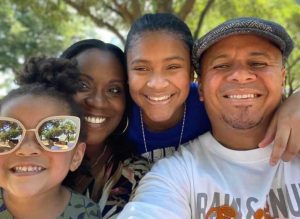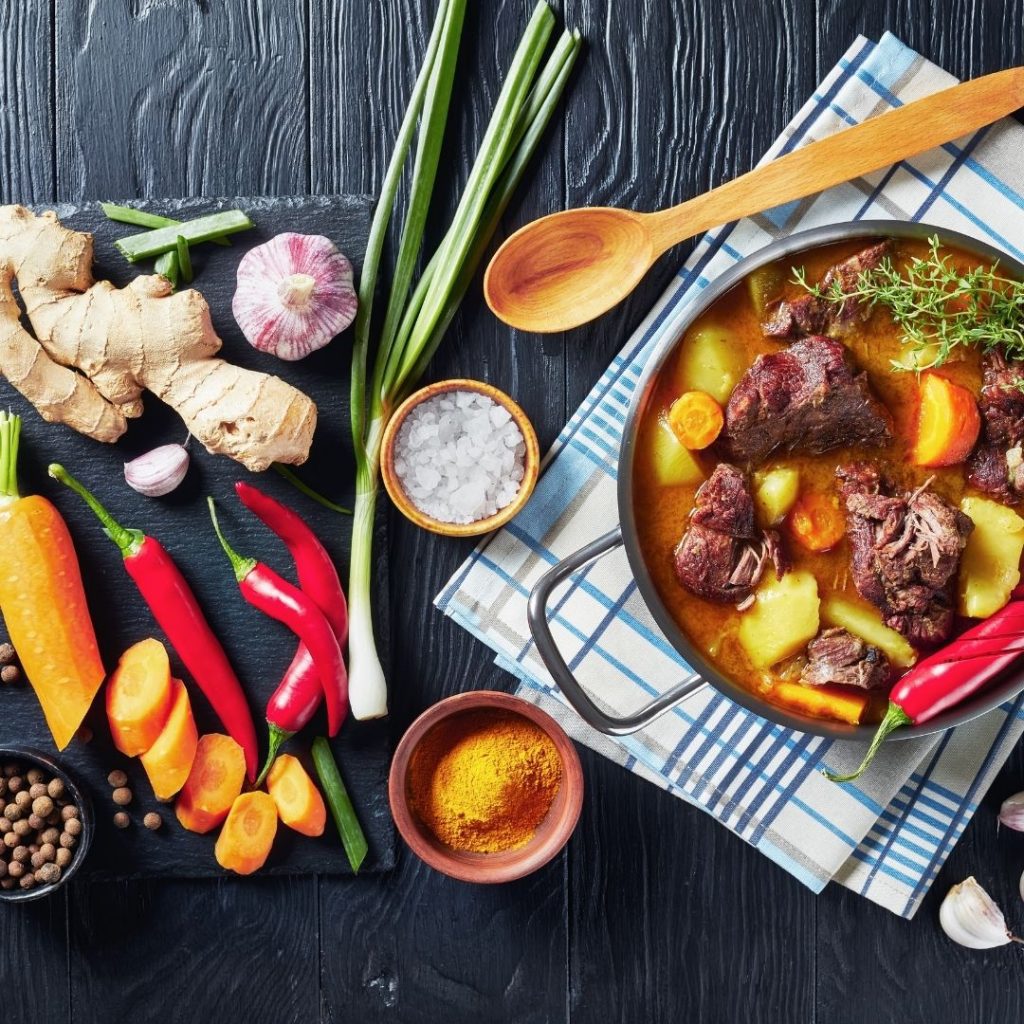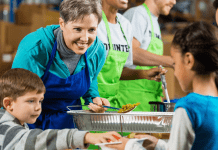If we’re very lucky, at some point in our lives, we knew what it meant, and what it felt like, to sit down to a meal that loving hands prepared for us, with familiar ingredients and tastes that made us feel safe. Some of my favorite writing on the subject of coming to the table are from Shauna Niequist, who writes about the almost-religious experience one feels when joining loved ones at a communal table to break bread.
I’ve been a mother for almost 10 years, and it’s been a joy to introduce my kids to ingredients/cuisine they won’t experience during the school day. I’ve hidden a smile when they popped edamame into their mouth at a sushi restaurant (this happened only with my firstborn; don’t be too impressed), I tamp down my joy when they slurp soup filled with kale, I acted non-plussed when they eat seafood and proclaim they love it.
But as much as I consider myself an adventurous cook who exposes her kids to new and different foods, I’ve not pushed myself into the African diaspora of cuisine. Why not, you ask? I tried Ethiopian food once as a 20-year-old and remember very little, other than it felt very exotic. I make grits on occasion (stop laughing).
But beyond that, I know there is a LOT to learn and I’m excited to be educated by a group of amazing women who have taken the time to explain and teach and show how their cultural heritage plays a role in their motherhood, their cooking, their children’s learning.
Learning about Afro-Caribbean Cuisine with Alexis Maycock
Tell me about your motherhood journey.
I am a mom of two girls, a 4-year-old and an almost-14-year-old. I always knew I wanted at least one child. As you can tell by the age difference between the two girls, my second daughter wasn’t entirely planned. However, I love them both and they have helped me to grow in so many wonderful ways as a person, and I can’t thank them enough. The motherhood journey requires selflessness, courage, empathy, and tenacity among other things. It has its moments of intense challenge, but then it has the beautiful moments of pure joy and deep satisfaction.
I wouldn’t trade being a mother for anything in the world. It has taken me a few years to get to the point where I could say that and truly mean it, but I do. I owe that in part to discovering the parenting style of positive parenting several years ago. It has truly changed how I approach my role as a mother. I have built a blog and social media community around positive parenting and how to help other moms parent with intention.
What are some of the unique challenges you face as a mom?
Raising biracial children in the culture we live in is exhausting at times. As parents, we toe the line between awareness and fear. We teach our girls to embrace their biracial identities and to be proud. But we also know we have to equip them for the obstacles that they will face as they grow older because this country is still not at a place of equality and equity for all.
What are you teaching your kids about your Jamaican-Guyanese culture?
On culture, my husband was born and raised in the beautiful South American country of Guyana; I was born and raised on the beautiful island of Jamaica. My daughters are biracial and are growing up in a Jamaican-South American household. Even though we are living in the U.S., through my husband and me and our respective families, our girls are learning about and exposed to their cultural heritage on a daily basis.
On cooking, I am teaching my oldest the basics and then adding in recipes from her cultural heritage: Jamaican and Guyanese.
On racial equality, my girls have always been taught that equality should be available to all, regardless of race. They have also, unfortunately, had to be taught that there are certain people and systems out there that will judge them in a negative way because of the color of their skin. I have had to teach my 13-year-old how to handle herself in certain situations so that she can be safe. I have to equip her to be able to survive in a world that may not always welcome her for the amazing, talented, and beautiful person that she is because their view of her may be tainted by racism.
How does Jamaican & Guyanese food play a role in your culture?
Food and motherhood went hand in hand, as I learned how to cook from my grandmother and my mother. In a Jamaican household, the kitchen is the center of the home. Kids are taught as young as age six how to cook and navigate their way around a kitchen. Any time is a good time for Jamaican food!
But weddings, birthdays, and other special occasions are when Jamaicans truly shine with our more traditional cuisine: Jerk Chicken, Curry Chicken, Ackee, and Saltfish, to name a few. My paternal grandmother, Pearl Bell, was a professional chef in our native country of Jamaica. She was the private chef for Chris Blackwell, founder of the recording company Island Records. She cooked for the likes of U2, Mick Jagger, Grace Jones, and Bob Marley. After being diagnosed with an illness that would leave her unable to walk and moving to the U.S., she retired from her job as a professional chef to the stars and shifted to passing down her recipes to her children and grandchildren. She also co-authored a cookbook: Jamaican Cook to the Stars: Pearl’s Delicious Jamaican Dishes.
I have vivid memories of being in the kitchen with her, learning how to make curry chicken and rice and peas and other dishes from back home. Her culinary skills were not only limited to Jamaican cuisine. She also taught me how to cook a steak medium-rare, how to make a French omelet, and make the most moist and delicious pound cake you ever tasted. If she was here today, she would remind me that Jamaicans are hospitable and that my pantry and fridge should always be well-stocked with staples so that I can whip up something for anyone who may stop by and be in need of a hot, home-cooked meal.
Please share the Afro-Caribbean recipes your kids love!
My 4-year-old is a very picky eater, so she is not a fan of any of our Jamaican-Guyanese cuisine! My 14-year-old, however, has many favorites: Jamaican Curry Chicken and Rice and Peas, Guyanese Roti, Guyanese Pepper Pot, Jamaican Fried Dumplings, Jamaican Beef Patties, Jamaican Fried Plantains, Jamaican Saltfish Fritters, Guyanese Pastries, and Jamaican Hot Milo Drink, just to name a few.














